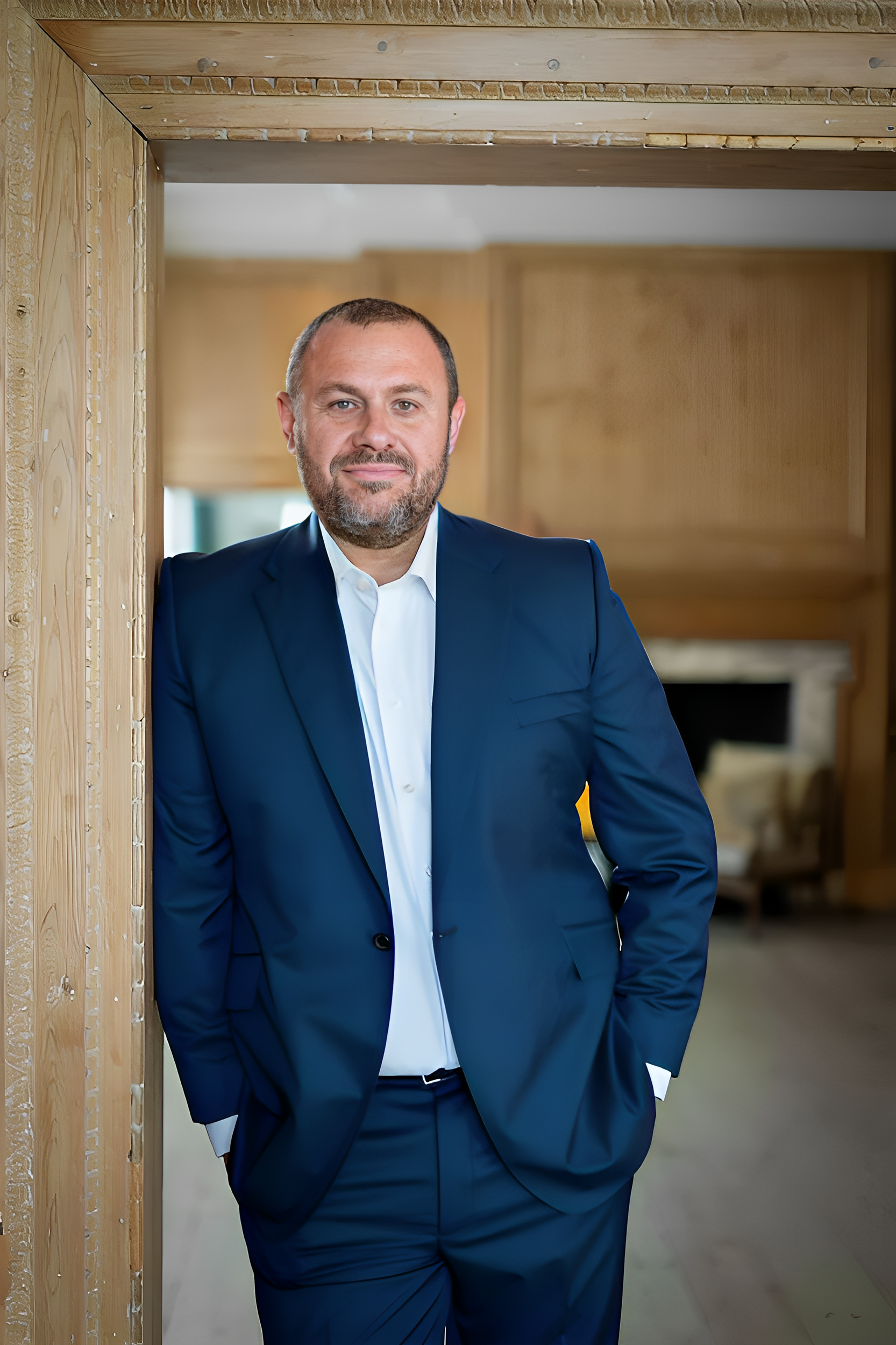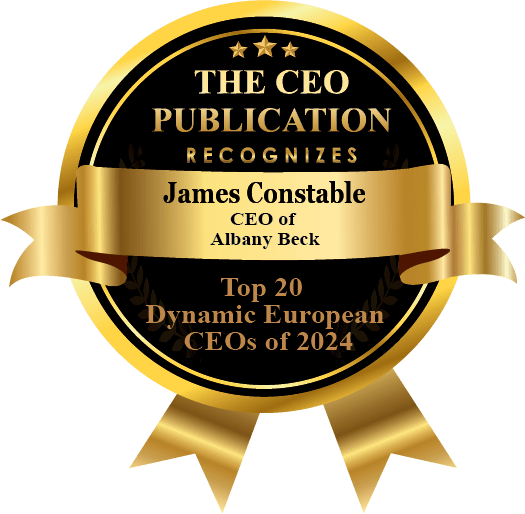

CEO
Emotional intelligence (EI) is the ability to recognize, understand, and manage one’s emotions and those of others. Leaders with high emotional intelligence are more likely to create a positive work environment, inspire and engage their teams, and achieve better business results. James Constable, the CEO of Albany Beck, is a leader with incredibly high emotional intelligence and levels of empathy. These qualities have had a significant impact on all his business decisions as well as his leadership style and structure. Because of his unique attributes, James constantly puts himself in another person’s situation and thinks, “How would I behave if I was that person?” It enables him to understand what is needed more clearly. “I’d never expect someone to do something I’m not prepared to do myself. My emotional intelligence is probably why I also respect the quote from Aristotle: “The whole is more than the sum of its parts.” It’s the significance of people working together to create something greater than what any of us can contribute individually that I am a firm believer of,” says James. “Everyone can contribute; everyone has a role to play in our company. It’s about putting people in the right seat and empowering them to be their best version. This is what gets the best outcomes for everybody.”
For James, getting the culture right is also vital, and he firmly believes in having an open and transparent culture at Albany Beck. He wants people to feel more responsible towards the organization and comfortable bringing ideas to the table – Albany Beck has no bad ideas. There’s no red tape.No one’s chastised for sticking their neck out. Thanks to James, who is good at extracting this from people because there is no illusion. It is a simple philosophy—what they see is what they get.
“I think you can talk to anyone and give them critical feedback because if it is constructive and comes from a position of moving forward positively, and if it’s said in the right tone and manner with professionalism, then it’s not offensive: it’s empowering. I get excited by working alongside people who want to make a difference,” adds James.
The pioneering leader has also been hailed as a visionary, as he has an incredibly intuitive mindset, which helps him plan ahead of time. This is done by consciously analysing all the time. For example, before the first COVID lockdown, James began planning how the business would work through those difficult times. And when the company was thinking about the possibility of ‘unlocking,’ James was thinking about the impact on his teams and the changes they might be expected to make as they returned to the office. “I’m constantly thinking about what things might look like in the future,” he says.
Encouraging Great Ideas
Being a dynamic leader means encouraging teams to think about great ideas constantly. James has created an open and transparent culture where everyone knows it’s good to share ideas, and they’ll be listened to and respected. This means excellent potential can come from the team. They know they’ll be heard and rewarded. Adam Kelly, who worked for Albany Beck in London, is a great example. During the Brexit transition, he approached James to extend the company into Ireland. “We investigated and developed the possibilities, and a few years on, we’ve exceeded all expectations by ensuring the highest level of delivery for our clients in the Irish market as well as achieving two ‘Invest in Ireland’ awards,” elucidates James. It’s important to realise that other people within your company hold so much potential. I like the fact that people have ideas and are eager to bring them forward.”
Phil Wood, who runs the UK office for James, wanted to build an academy to train graduates in various aspects of technology so they could complement Albany Beck’s consulting offering. He was steadfast in having ‘in-person’ learning opportunities instead of the training being done virtually, as he felt there would be more assertive behaviors and outstanding commitment to the Albany Beck brand. Despite being considerably more expensive for the company to hold ‘in-person’ training, it’s proved highly successful. “If I’m not creating that culture where my team feels they can come forward with inspirational possibilities, then where’s the potential for Albany Beck? I don’t understand companies that block people’s inspiration,” explains James. “I don’t sit in an office; I like staying on the floor. That’s where the future lies – building ideas and sharing possibilities. I don’t have all the ideas. It’s the team that will build our business.”
Turning into A Dynamic Leader
Sharing his thoughts on becoming a dynamic leader and attaining success, James says, “Do you ever get to where you want to be? I’m not sure if you asked Richard Branson, he’d say that he’d achieved ‘success.’ It suggests a finite ending. But he’s been successful, and he’s wanted to continue to be successful. I think that’s where I’m at. You know the hardest part about being an entrepreneur is that you’re never content, but I don’t see this as an insult. It’s a compliment.”
He continues, “People who have stopped moving forwards often wake up one morning, and their business is out of date and failing. You need to evolve and constantly ask yourself the ‘WHAT IF’ questions. I remember when Albany Beck was started, there wasn’t any interest in lending financial support to a 26-year-old, and so the first two or three years were tough, tough years – there wasn’t a salary while we were building the company, so I ate A LOT of the free porridge that was supplied to the communal kitchen in our office block! We call it “The Porridge Years.” But, we evolved, moved forwards and constantly asked those tricky ‘WHAT IF’ questions, disrupting the norm.” James adds, “So, I don’t believe that we’ve ever got to where we’re due to get to. But we’ve had some incredible milestones along the journey so far. I’d like to think that there’ll be many more milestones along the journey. In my head, I’m thinking that to reach 1,000 consultants would be a success, but when we have 1,000 consultants, I’ll probably want 2,000!”
James advises every young and established entrepreneur, saying that this journey is an absolute hard graft: it’s relentless. Because there’s always someone as hungry for success as a young leader. But one has to keep going, and his most significant advice is never to doubt themselves. He addresses it as ‘having the blinkers on.’ Just like a horse when it’s racing, leaders need to have their blinkers on to move forward without hesitation. They must back themselves to the hilt; otherwise, it’s easy to get a sense of Imposter Syndrome, and that’s when self-doubt sets in. Once that happens, they will compare themselves to individuals like Elon Musk and think, “Why would someone want to read about me in the CEO Magazine?” Doubts have no place. “You need to eradicate those voices in your head because, at the end of the day, you didn’t win your job in the lottery; you’ve worked with dogged determination to get where you are. You worked for it. If you don’t flick that Imposter Syndrome away, it will manifest itself, get bigger, and before you know it, you’re thinking, “Can I create my own company?” You MUST believe in yourself and back yourself again and again and again,” he expounds. “You must take risks: it’s essential.”
According to James, if you plot your route from A to B with no deviations – even if there is a crash, a traffic jam, or a road closure – your route will come to a halt. You need to work out the plan and then execute and deliver it. This will mean deviating when required or when a different route looks better. A leader needs to test it out by talking with people. They must think about what’s required to get them to the next level and drive forward. An effective CEO must take risks to be a practical and inspirational leader. “I’m good at setting the agenda and the strategy, positioning the blueprint and then encouraging others around me to join in on the journey,” he adds. “I can remind people of why they’re on the journey, focusing them on what it means to create something unique from scratch. I think I enable them to work to a higher purpose.”
That’s not to say that one must take risks without listening to others around them. When a person is running at 100mph, it’s crucial to stop and celebrate the successes: to remind oneself of why they are on the journey in the first place. Checking in with others along the way, praising and rewarding them, is vital. Otherwise, one rarely slows down, smells the roses, and enjoys the journey: they constantly look for the next step. “When you have a colleague, who is realistic and pragmatic, in the room saying, “the engine’s smoking,” I have to listen. I don’t stop but taper the journey without taking the foot off. I recognize the importance of bringing others with me.”
It is this attitude of James that has helped Albany Beck to transform. It’s been a tough year for the industry, but it hasn’t been for the company. Albany Beck works with 15 of the world’s biggest investment banks. Globally, they now have 400 consultants in America, Europe, and Australia. Last year, they were the fastest-growing mid-cap company in Ireland regarding the headcount. Having the courage to challenge themselves constantly has enabled Albany Beck to evolve into a different type of business today. “I have total belief in what we’re doing and that we’ll deliver on what we’ve planned to achieve, and I’m driven to execute it,” he interprets. “This courage to stand by my convictions, to be able to look my team in the eye with total belief in what we’re doing, motivates them to follow me over the top of the trenches daily. They trust in my resilience to get the job done. Without this courage and perseverance, my team wouldn’t join me in the evolution and disruption of the norm to take Albany Beck to greater heights and benefit in the spoils of that success.”
Creating A Great Brand
Albany Beck’s mission is to disrupt the traditional consultancy model globally. To achieve this, James and his team are dedicated to offering inspiring young people the opportunity to have a career with them. The company’s pioneer model is about getting bright, emerging talent into the industry and giving them the tools to succeed. “We don’t tend to go for the ‘red brick university’ candidates. 40% of our consultants never attended university. For Albany Beck, it’s about attracting people with life experiences, people from community colleges, people from disadvantaged backgrounds who perhaps haven’t had the opportunity to find success yet,” states James. “It’s fulfilling to witness them flourishing in our company. We’re committed to addressing the imbalance between male and female gender splits within financial services, and 42% of our consultants are female. To take the company to great heights, this vision to develop a diverse workforce for the future is part of the cornerstone to our success.”
Albany Beck has recently won several awards, and that’s an incredible achievement for everyone who is part of the team – everyone in the Head Office and every consultant. “It’s an exciting time. Currently, we’re actively hiring more people, bringing more emerging talent on board. It means that we’re extending our academies even further to provide our consultants the perfect mix of training and support, so they have the tools to work with clients successfully,” proudly says James. “For example, we’re expanding our Data Academy and the Business Analysis Academy. For me, it’s about empowering them to grow. As long as they have the right attitude, it’s just a matter of time before they succeed.”

" I’d never expect someone to do something I’m not prepared to do myself. My emotional intelligence is probably why I also respect the quote from Aristotle: “The whole is more than the sum of its parts.” It’s the significance of people working together to create something greater than what any of us can contribute individually that I am a firm believer of "
James Constable
CEO
© THE CEO PUBLICATION 2021 | All rights reserved. Terms and condition | Privacy and Policy